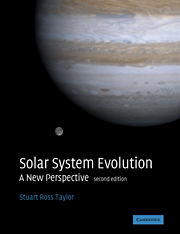Book contents
- Frontmatter
- Contents
- Preface to the First Edition
- Preface to the Second Edition
- Acknowledgments
- Prologue
- Chapter 1 A brief history
- Chapter 2 The universe
- Chapter 3 Stars
- Chapter 4 The solar nebula
- Chapter 5 Composition and chemical evolution of the solar nebula
- Chapter 6 The evidence from meteorites
- Chapter 7 Building planets
- Chapter 8 The giant planets
- Chapter 9 Satellites and rings
- Chapter 10 The refugees
- Chapter 11 The survivors: Mercury and Mars
- Chapter 12 The twins: Venus and the Earth
- Chapter 13 The Moon
- Chapter 14 The role of impacts
- Chapter 15 Epilogue: on the difficulty of making Earth-like planets
- Name index
- Subject index
Chapter 7 - Building planets
Published online by Cambridge University Press: 05 June 2012
- Frontmatter
- Contents
- Preface to the First Edition
- Preface to the Second Edition
- Acknowledgments
- Prologue
- Chapter 1 A brief history
- Chapter 2 The universe
- Chapter 3 Stars
- Chapter 4 The solar nebula
- Chapter 5 Composition and chemical evolution of the solar nebula
- Chapter 6 The evidence from meteorites
- Chapter 7 Building planets
- Chapter 8 The giant planets
- Chapter 9 Satellites and rings
- Chapter 10 The refugees
- Chapter 11 The survivors: Mercury and Mars
- Chapter 12 The twins: Venus and the Earth
- Chapter 13 The Moon
- Chapter 14 The role of impacts
- Chapter 15 Epilogue: on the difficulty of making Earth-like planets
- Name index
- Subject index
Summary
In this chapter I discuss ideas on the construction of planets. These notions are naturally heavily biased toward observations within our solar system, although I include some comments based on the discovery of extrasolar planets. Although limited, these are already shedding light on some of the problems and importantly on the distinction between planets and brown dwarfs. The conclusions from these new bodies appear to be broadly consistent with present ideas. The extrasolar planets that are found in close orbits probably originated in a similar manner to our own gas giants, although subject to later migration, something that may have also happened to our own giants.
The problem of building planets is fundamental to the entire question of the origin of the solar system. Historically, this latter question has frequently been considered to have been solved, but the wide variety of explanations and solutions that have been offered, from the creation myths of primitive societies, to the more recent, but numerous, scientific attempts, have generally collapsed when faced with new information about the system [1].
There are two principal difficulties. The first dilemma is that until very recently planetary scientists, like historians, had only one example, the present scene, together with whatever relics have survived from previous epochs, to tell the tale of former events [2].
- Type
- Chapter
- Information
- Solar System EvolutionA New Perspective, pp. 163 - 196Publisher: Cambridge University PressPrint publication year: 2001



